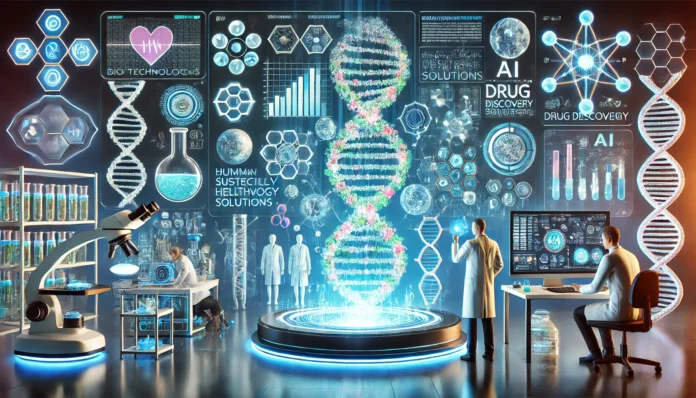Artificial intelligence (AI) is revolutionizing the biotechnology landscape, transforming how drugs are discovered, diseases are predicted, and precision medicine is delivered. By harnessing the power of AI, researchers and healthcare professionals are breaking barriers to improve patient outcomes and make healthcare more accessible, efficient, and innovative.
Accelerating Drug Discovery
Traditional drug discovery processes can take over a decade and cost billions of dollars. AI is streamlining this process by identifying promising compounds and predicting their efficacy at unprecedented speeds.
How It Works
- Molecular Modeling: AI algorithms analyze vast datasets of chemical compounds and simulate their interactions with target proteins.
- Repurposing Existing Drugs: AI systems like Insilico Medicine identify new uses for existing drugs, significantly reducing development time.
- Clinical Trial Optimization: AI predicts patient responses and optimizes trial design, increasing the likelihood of success.
Real-World Applications
- AlphaFold: DeepMind’s AI tool predicts protein structures with high accuracy, accelerating research into diseases like cancer and Alzheimer’s.
- BenevolentAI: This platform uses AI to identify drug candidates for complex diseases, including rare conditions.
Predicting Diseases and Outbreaks
AI’s ability to analyze and interpret large datasets is proving invaluable in disease prediction, enabling earlier interventions and better resource allocation.
Disease Prediction Models
- AI-driven models analyze genetic, environmental, and lifestyle data to predict an individual’s likelihood of developing certain diseases.
- Example: IBM Watson Health uses AI to assess cancer risks by analyzing patient histories and medical records.
Global Outbreak Tracking
- AI systems like BlueDot detect outbreaks by scanning news reports, public health data, and airline records. BlueDot predicted the COVID-19 outbreak days before it was officially reported.
Precision Medicine: Personalizing Patient Care
AI enables a shift from one-size-fits-all treatments to tailored therapies that consider an individual’s unique genetic makeup, lifestyle, and medical history.
Applications in Precision Medicine
- Genomic Analysis: AI tools analyze genetic data to identify mutations linked to diseases.
- Example: Foundation Medicine provides genomic insights to guide cancer treatments.
- Tailored Treatment Plans: AI recommends the most effective treatments for patients, minimizing trial-and-error approaches.
- Real-Time Monitoring: Wearable devices integrated with AI track patient data, enabling proactive healthcare decisions.
Sustainability and Scalability in Biotech
AI not only improves efficiency but also enhances sustainability and scalability in biotech.
- Resource Optimization: AI reduces material and energy use in drug manufacturing.
- Global Reach: AI-driven solutions can be deployed in resource-limited settings, democratizing access to advanced healthcare.
Challenges and Ethical Considerations
Despite its transformative potential, AI in biotech faces significant challenges:
- Data Privacy: Handling sensitive medical data raises concerns about privacy and security.
- Algorithm Bias: AI systems can perpetuate biases in healthcare if trained on unrepresentative datasets.
- Regulatory Hurdles: Adapting existing regulations to encompass AI-driven solutions remains a complex task.
- Cost and Accessibility: Advanced AI tools may not be affordable or accessible in low-income regions, potentially widening healthcare disparities.
The Future of AI in Biotech
The fusion of AI and biotechnology promises a future where:
- Drug Development: Becomes faster, cheaper, and more precise.
- Healthcare Delivery: Shifts towards proactive, rather than reactive, care.
- Global Health: Benefits from equitable and scalable AI-driven solutions.
By integrating AI into biotech, humanity is not just curing diseases but also reimagining what healthcare can achieve. As these technologies evolve, they hold the potential to create a healthier, more equitable world.





